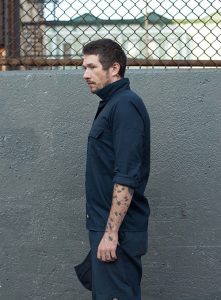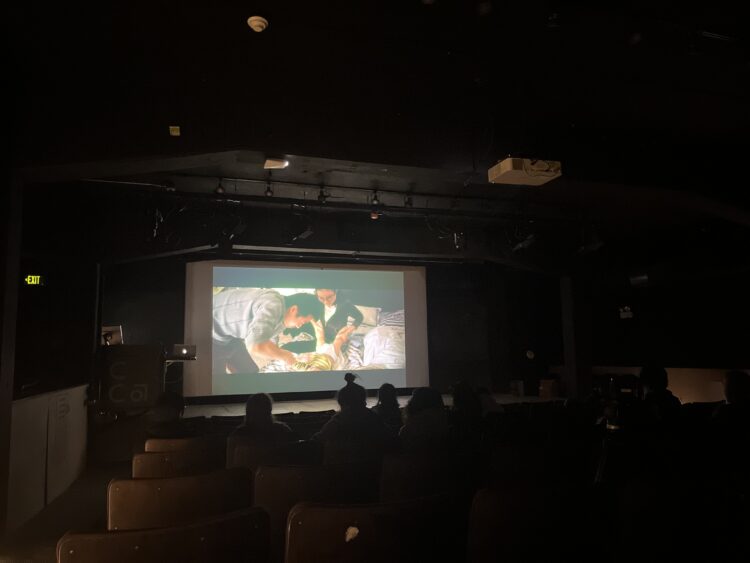Jesse Ball’s New Novel CENSUS Proposes Other Ways of Knowing

How do you give an important person in your life a role in your art without speaking for them? This was the challenge Jesse Ball faced in writing his newest novel and Creative Capital Project, Census, published on March 6. In the preface of Census, the author explains that his brother, who had Down syndrome, died in 1988. Having always wanted to write a story with his brother as a character, Jesse decided to fit him “in the middle” of the plot and only explain the impressions he makes on other characters. In this way, Jesse hopes the book will help “people to see what it is like to know and love a Down syndrome boy or girl.”
Census tells the story of a widowed doctor diagnosed with a fatal illness. He decides to go on a final road trip north with his son, finding a job as a census-taker that is conducted through visiting houses across the country. It is not explained that the son has Down syndrome, but we infer that he sees and acts differently than those around him. The census they perform becomes a platform for the doctor to study and muse upon the world. The son’s presence in the story is ethereal, but felt. He shapes his doctor’s perspective; the doctor explains that it was the son “who prepared me for this work, my son who showed me, not in speech, but in his daily way, that we are by our nature a kind of measure, that we are measuring each other at every moment.”
I asked Jesse if, similarly, his brother influenced the way he sees the world. “Yes, completely,” Jesse wrote. “I think that the way he saw the world, and then the trauma of his death were two factors leading to the perception I sometimes have, sometimes fail to find, but am always striving for: the vision of a child, but without fear. A kind of undifferentiated sight.”
In person, Jesse has a deeply meditative demeanor. Similarly, the doctor’s reflections in Census are like Zen koans—reading his narration feels like both meditation and a philosophy lesson. Every town, house, and family that the doctor visits have certain characteristics that differentiate them from each other, and they allow a platform for the doctor to consider every day life.
The logistics of the doctor’s new profession as census-taker are as poetic as they are mysterious. Eventually, the doctor disregards the rules the census bureau gives him, and he uses his new profession to compile stories that capture the essence of the people he visits. I asked why Jesse used the census as a way to structure the book.
“It is what happened when I sat down to write the book. In a sense it is arbitrary,” Jesse said. “In another sense, the nature of the census permits a sidelong view of the entire enterprise of sight and human culture.
“As humans we attempt to ascertain what it is that surrounds us, who it is that are near us. We want to know things. Sometimes we get used to knowing them in certain ways, and those ways blind us to other ways of knowing. Having the census be the work that the father does permits us to see that the son is meanwhile conducting his own kind of census, one that is quite different in every way. Of course, the readers do the same, and perhaps they will pay attention to the choices they make in choosing to see things one way or another. One gets to choose who one will be each day. You are not stuck in your life.”

Jesse Ball
In June 2017, Jesse penned an op-ed in the Los Angeles Times titled, “Everyone should go to jail, say, once every ten years.” The article was a sort of Swiftian “modest proposal,” suggesting citizens should serve brief sentences of incarceration in maximum-security prisons once a decade, like jury duty. The process would encourage Americans to empathize with prisoners and allow us to better understand the mass incarceration problem in the country.
While reading Census, I realized that the novel and this article both had a unique way of asking their readers to empathize with severely marginalized voices—people who, traditionally, have no voice in our culture. I asked Jesse if he saw this as an overall goal of his work.
“I believe that realism such as it is in the news, in the history of literature and art, film, etcetera, is often misconstrued as reality itself. The supposed realistic perspective is just that—one perspective. Of course, I am an empiricist. I believe in the scientific method, etcetera. And part of the idea of science is that an experimenter must examine her biases and protect against them.
“In culture and in life there are two principal biases that we must always correct against. One is the human bias—that humans are the center of the universe, and the font of all meaning. The second is that for the one who is alive her life and perspective seem endlessly true. In fact this one-perspective realism is a deep fallacy.
“We can only find things that tend towards truth by balancing perspectives, as many as possible, and by looking not for what we expect, but for what is actually there.”
Jesse Ball’s new novel is available in bookstores and online. He kicks off his promotion tour on March 6 in a reading and discussion at Books are Magic in Brooklyn, New York.
